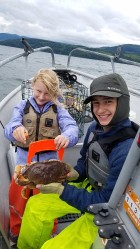← Older posts
Spring days are getting longer, weather milder and it seems that everything around here is growing at an exponential rate– particularly the forest understory and some early wildflowers. “Fairy slippers ” are a native calypso orchid that produces a single, beautiful purple flower.
These dainty plants prefer wooded slopes that experienced historic burns and we have that habitat here. We find these flowers in the company of another spring icon, the morel mushroom. These tasty mushrooms are around for only a short time in spring and searching for them is akin to an easter egg hunt that can be alot of fun. Woody and rich in flavor, fresh morel’s are excellent quartered, sauteed in butter and served over a fresh venison steak.
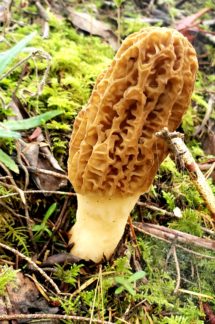
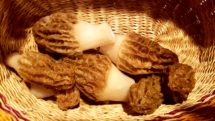

Glass Beach, Port Townsend is one of the best beaches in the country to find quality, “jewelry grade” beach glass. Historically the high bluffs around Port Townsend were used to dump trash including glass onto the surrounding beach and into the Strait for over a century. True sea glass is produced where adequate beach tumbling has occurred. This is a natural function of the waves, water, current and substrate wearing down the sharp edges until they smooth into a myriad of colors and shapes. The more current, tide fluctuation and higher PH of the saltwater the better and we have all of those conditions happening on our beaches here. Since this unique process does not occur everywhere it makes these local “gems” highly prized– and it is believed that sea glass from glass beach, Port Townsend is of the best quality and concentrations anywhere in the Pacific Northwest. In addition to the sea glass, beachcombing along the Strait of Juan De Fuca can also produce other treasures including intricate driftwood plus agates and an assortment of colorful rocks deposited here many years ago from glacial deposits after the last ice age. Heck– even Woolly Mammoth bones, teeth and tusks have been discovered along the beaches here !
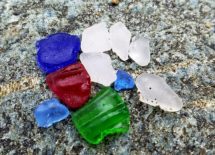
Our cabins and headquarters are conveniently located near an exclusive access to glass beach allowing these treasures to be found within a short beachwalk or hike during the low tides of spring and summer days.
After sustaining an injury on a family vacation in Maui this past February ( long story ) I’ve been prescribed mandatory down time and decided to get some work done on a portion of the decoy rig. In particular, some well worn Herter’s solid styrofoam duck decoys. Much of our early hunting rig originated from decoys purchased when I began the obsession with diver and sea duck hunting in the early 1990’s . Additionals accumulated over the years included a handful dating back to my late grandfather’s duck rig from his hunts in the 60’s and 70’s. Resilient to stray shot and hard hunts, who would have thought these old styrofoam decoys would now become collectables and heirlooms ?! Many of these dekes had been well used over the years and it was time to give them some much needed attention.
The majority of our Herter’s rig consisted of magnum 72 and lifesize 63 “Ultimates” models in both diver and puddler duck bodies. These decoys were some of the last models Herter’s produced before all plastic decoys took over the majority of the market– a heavy plastic layer coated on the topside greatly increased their resiliency over the basic all styrofoam models. Custom burlapped, “suc duck” and original flat bottom models from the early 60’s made up the remainder of our Herter’s rig.
Some of the downfalls of the later Herter’s decoys were their cheap eye bolts, hollow/brittle plastic heads and that exposed iron metal inset within center of the keeled models. I’m certain waterfowlers accustomed to hunting freshwater lakes and rivers may have less of these issues, but over the past decades 90% of our usage has been hunts on salt or brackish water and these particular parts of some decoys had been damaged and degraded over time.

before…the ugly underbelly
The restoration begins —
I began by using a combination of West System epoxy, fiberglass and a walnut shell/sawdust mixture applied to the undersides of each decoy to seal any exposed styrofoam and those rusty iron keels. In addition, a light coat of epoxy was added to the topsides plus a sprinkling of this “restle coat” mixture to give the decoys some texture and grip. Titebond 3 glue also works well for the restle coat process.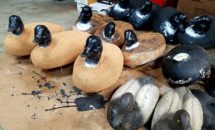

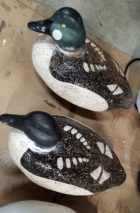
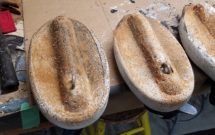 Next I patched any stray pellet holes in the bodies with PC11 epoxy and affixed updated solid core heads with installation of stainless steel eye bolts. After the epoxy had cured, decoys were lightly sanded then coated with a liberal application of Zinser oil primer as a base coat. The final paint was a combination of Ronan oils, Krylon rattle can flats and enamels for the bills. When this was dry and well cured the dekes were coated with a clear matte spray for an extra layer of resiliency. Now these old Herter’s are ready for a few more decades !
Next I patched any stray pellet holes in the bodies with PC11 epoxy and affixed updated solid core heads with installation of stainless steel eye bolts. After the epoxy had cured, decoys were lightly sanded then coated with a liberal application of Zinser oil primer as a base coat. The final paint was a combination of Ronan oils, Krylon rattle can flats and enamels for the bills. When this was dry and well cured the dekes were coated with a clear matte spray for an extra layer of resiliency. Now these old Herter’s are ready for a few more decades !
The finished products —
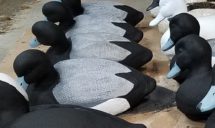
Model 72 broadbill
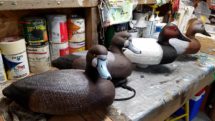
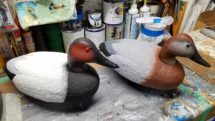
Model 72 “flat bottom” can pair
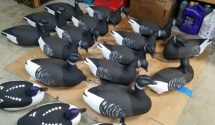
Model 81 and 92 black brant
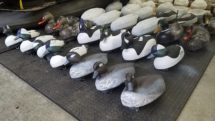
Model 63 buffs and 72 goldeneye
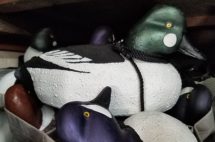
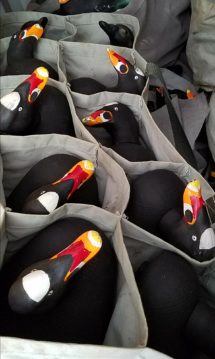
Model 72 scoters
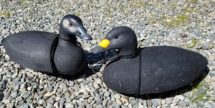
Model 72 and suc duc puddlers in the mix


…even some old style, flat bottom model 63’s made up as coots !
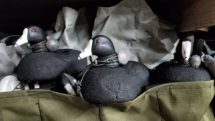

We christened our new Bankes Revolution two man layout boat this past weekend on an action packed harlequin duck hunt. Repeat hunters Phil and Carolyn were game for the adventure, so in predawn light we set out in our tender fv Siwash towing this new duck boat through the openwater for several miles then inshore to a secluded cove and set a rig for the “blue ducks”. Our services have been employing single man layouts as an option for many successful seasons and now this two man boat allows even more options to make layout hunting a social/ group affair. The boat is a good hide, yet substantial with plenty of room for each hunter– including separate cockpits and gun rests, high sides, a sprayskirt and very towable hull. This Bankes Revolution is an impressive boat that was obviously well thought out prior to production. Our first hunt with Phil and Carolyn and the new layout was a great success and we plan to use the 2 man Bankes on more hunts as the season progresses. It’s likely going to perform great on scoter , ‘bills, oldsquaw, goldeneye and black brant hunts as well.
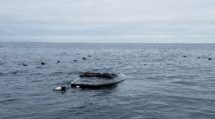
Bankes Revolution two man layout
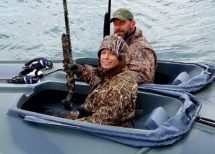
layout boat hunt for harlequin ducks
Last weekend marked the opening day of waterfowl for 2017 as we celebrate our 19th season guiding hunters on these spectacular ducks. Calm waters and brisk temps in the upper 30’s were presented to us on opening morning, so the sites were set on a quick hunt for the plentiful flocks of surf scoters that have been marauding a local mussel farm.

opener sunrise
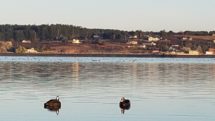
flocks and dekes
Action was consistent on these “toucan bills” as they moved in on first light and in short time 4 limits of drakes were on the gunnels and a hungry crew heading to breakfast.
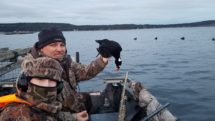
Jack’s drake surf
I’m a little late on the game getting our fishing season wrap up written. My apologies as we’ve been fervently getting the duck boats, dekes and gear ready for our waterfowl season that started last weekend.
Briefly– ample freshwater runoff from a long wet spring and little bait accumulation dampened the fishing on our local reefs for the lingcod and halibut openers this past May. Luckily, conditions shaped up as the season progressed and we ended up taking some nice lingcod later in the month. Halibut remained slow locally, and with the extremely limited days wdfw has given us to fish the flatties these past few years there wasn’t much of a chance to redeem it. On a day “off ” Capt Dave and the LingHammer crew traveled West and tied into a beauty of an 80lb’r off Port Angeles, so the freezer didn’t go bare.
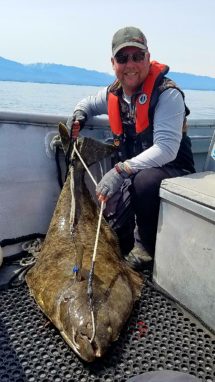
Lake Anderson trout redeemed the early spring fishing and put out some beautiful, sizeable and scrappy rainbows before the warmup. The short Spot prawn season was another good one and summer Dungeness crabbing in the Bays was excellent. Late summer saw some great bottomfishing on rock sole and even some big starry flounder in the mix as the crab pots soaked. The crew even got in some late night squid fishing.
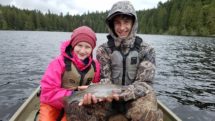
Anderson Lake rainbow
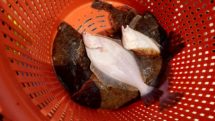
rock sole
The summer weather was beautiful this year– Seattle set a new record logging 56 days of rain-less, warm sunny days ( unheard of ! ). A rare treat for us Pacific Northwesterners. Fall is in the air now as I catch up on these blogs. The winds and rain have returned… Duck weather 🙂
The 2017 summer Dungeness crabbing season is in full swing now and it’s been a banner one so far. Those pinchered , delectable local crustaceans have been running larger than usual w/ a 7-8″ average in most of the areas we’ve been dropping the pots. A few bruisers even went over 9″ carapace ! Most of these large male crab have been in very hard shell condition, prime for the boiling pot and crab crackers. The summer season lasts until the first week of September so here’s to hoping the good fishing continues ! We haven’t had our fill yet.
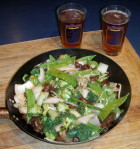
The majority of our guided duck hunts cater to collectors and hunters seeking that spectacular plumed drake destined for the taxidermist and ultimately a proud spot in their homes, offices and memories. All of us here at Peninsula Sportsman appreciate the challenges of these hunts and the reward of successful days on the water and in the blind. In addition to beautiful ducks on the wall this reward also includes the enjoyment in preparing, cooking and eating the wild game we harvest and waterfowl are some of the best of the wild meats. Most of the ducks we hunt here in coastal Washington have similar flavored meat regardless of species due to their diets in the saltmarsh and estuaries where they spend the Fall and Winter. These birds are a long way from the grain fed goodness of the Canadian prairies and interior. Certainly some of the species take a little more creativity and marinating than others ( the fish eating mergansers being one of the more challenging ), but all of the waterfowl we hunt including the sea ducks and divers are definitely edible, versatile and delicious if prepared and cooked correctly. This starts with properly cooled down birds that are plucked, cleaned, boned and meated out w/ all of their skin and fat removed ( this is what often retains the “off” flavor of many wild ducks ). Soaking this meat overnight in a light saltwater brine helps remove any of the residual blood in the meat and the result is a clean heap of boneless “organic” lean meat that is delicious and versatile in a variety of recipes. A handful of our favorites include Scoter stew, Tiffany’s famous duck chili, duck poppers, Scoter’Roni and a variety of Asian Stir Fry dishes among others.
Stir Fried duck w/ Broccoli and Snow Peas
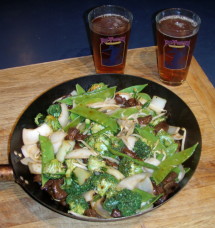
Jalapeño Duck Poppers with fresh grilled Hood Canal Oysters
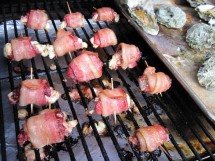
We enjoy these smoked sticks and jerky throughout the year – fishing , hunting, camping, football games and get togethers– they are the perfect snack anywhere.
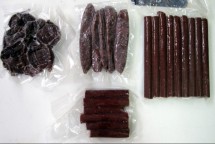
Scoter’roni, Goose jerky, Landjaeger

Goldeneye ducks. Striking, beautiful black and white ducks that migrate into our waters from the Boreal forests of the North. We enjoy two species of them in the West– the Common or American and the Barrow’s Goldeneye. Common’s are plentiful in the rivers, lakes and tidewaters of our state with wintering populations in the tens of thousands– Barrow’s are a special Western bird — far less plentiful than the Common’s with 8-10,000 of them wintering on our Coastal waters here in Washington. We start to see both species of Goldeneye after Halloween, mostly juvenile birds and hens arriving first– then as the breeding areas get frozen up North a better push of birds start showing up November thru the late season. The older drakes arrive in our wintering areas already sporting their best plumage. 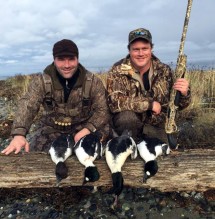 We just wrapped up a few days hunting with repeat clients from Mississippi that wanted to target both species on their hunts with us. Cliff had never shot a mature Goldeneye drake before last season and was lucky enough to take a hybrid Common X Barrow’s last December as his first– what luck !
We just wrapped up a few days hunting with repeat clients from Mississippi that wanted to target both species on their hunts with us. Cliff had never shot a mature Goldeneye drake before last season and was lucky enough to take a hybrid Common X Barrow’s last December as his first– what luck !
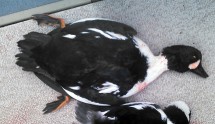
Barrow’s X Common hybrid
Good hunts were in store for them again this season as both Cliff and Will took some fine drakes of both species over the past few days. They will look great on the walls of both their trophy rooms. It’s shaping up to be another fantastic Goldeneye season around here !
← Older posts



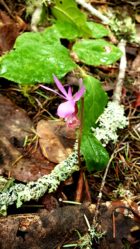







 Next I patched any stray pellet holes in the bodies with PC11 epoxy and affixed updated solid core heads with installation of stainless steel eye bolts. After the epoxy had cured, decoys were lightly sanded then coated with a liberal application of Zinser oil primer as a base coat. The final paint was a combination of Ronan oils, Krylon rattle can flats and enamels for the bills. When this was dry and well cured the dekes were coated with a clear matte spray for an extra layer of resiliency. Now these old Herter’s are ready for a few more decades !
Next I patched any stray pellet holes in the bodies with PC11 epoxy and affixed updated solid core heads with installation of stainless steel eye bolts. After the epoxy had cured, decoys were lightly sanded then coated with a liberal application of Zinser oil primer as a base coat. The final paint was a combination of Ronan oils, Krylon rattle can flats and enamels for the bills. When this was dry and well cured the dekes were coated with a clear matte spray for an extra layer of resiliency. Now these old Herter’s are ready for a few more decades !




















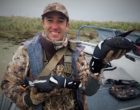
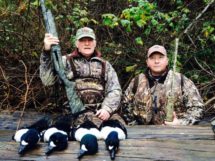
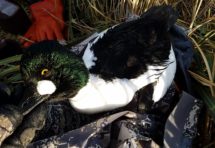 Common Goldeneye were plentiful as well. Surf and whitewing scoter numbers were strong, oldsquaw in their usual deep haunts, plus plenty of bufflehead and mergansers to keep us entertained on many of the hunts. In regards to puddlers, mallards were strong throughout the season and the pintail/ sprig were plentiful in the late season. Full plume gadwall, gw teal and wigeon were “bonus” birds over the last month. On to the offseason for some gear and boats maintenance, decoy repairs ( you know who you are ) and start getting the tackle ready for fishing this Spring… Salud !
Common Goldeneye were plentiful as well. Surf and whitewing scoter numbers were strong, oldsquaw in their usual deep haunts, plus plenty of bufflehead and mergansers to keep us entertained on many of the hunts. In regards to puddlers, mallards were strong throughout the season and the pintail/ sprig were plentiful in the late season. Full plume gadwall, gw teal and wigeon were “bonus” birds over the last month. On to the offseason for some gear and boats maintenance, decoy repairs ( you know who you are ) and start getting the tackle ready for fishing this Spring… Salud !